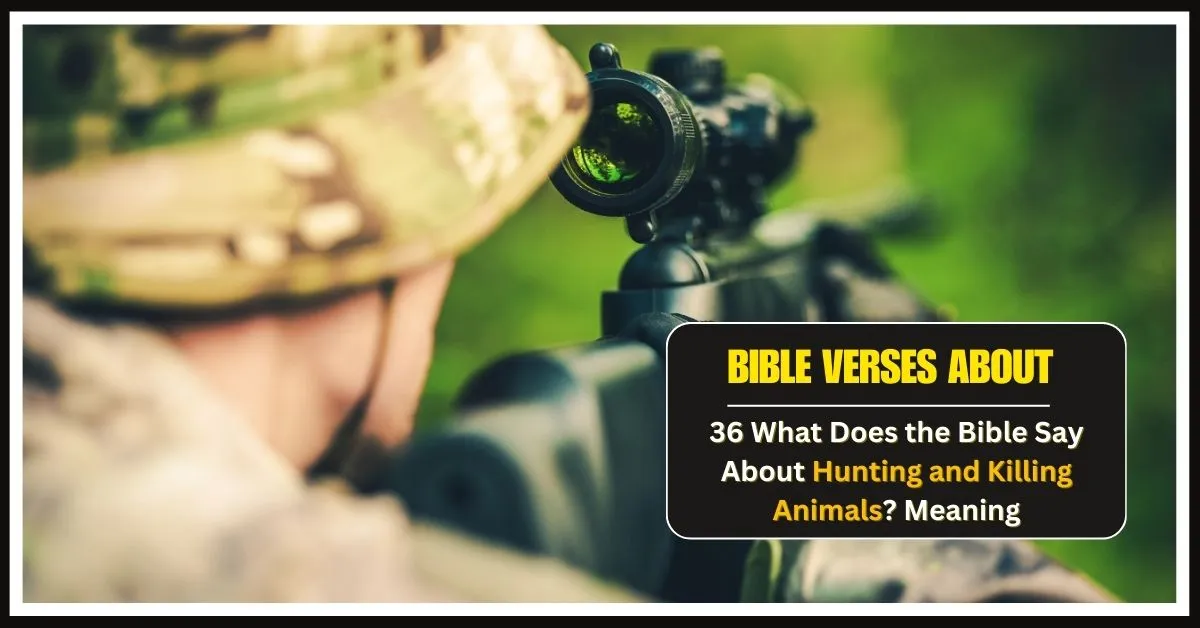Hunting and killing animals can bring up many feelings and questions. Some people wonder if it’s right or wrong to hunt. Others may ask if it’s okay to kill animals for food or how God feels about it.
Whether you’re a hunter, an animal lover, or just curious, this is a topic that can make you think deeply.
The Bible is a great source of guidance and comfort. It gives us answers to tough questions and helps us understand God’s view of animals and people.
In this blog, we’ll explore what the Bible says about hunting and killing animals. We’ll look at 15 important verses, explain what they mean, and learn how to apply their lessons in everyday life.
Also Read: What Does the Bible Say About Hunting?
1. Genesis 1:26
“Then God said, ‘Let us make mankind in our image, in our likeness, so that they may rule over the fish in the sea and the birds in the sky, over the livestock and all the wild animals, and over all the creatures that move along the ground.’”
Meaning:
This verse establishes humanity’s authority over animals as a gift from God. However, this dominion is not about exploitation but stewardship, reflecting God’s image in caring for His creation.
Application:
Approach hunting with a mindset of responsibility and gratitude. Consider how your actions honor God’s command to rule over animals with respect and care.
2. Genesis 9:3
“Everything that lives and moves about will be food for you. Just as I gave you the green plants, I now give you everything.”
Meaning:
After the flood, God permitted Noah and his descendants to eat animals, signifying a shift in humanity’s relationship with creation. This permission was grounded in necessity and survival.
Application:
When hunting, acknowledge it as part of God’s provision. Avoid wastefulness and recognize the life taken as a gift to sustain your own.
3. Proverbs 12:10
“The righteous care for the needs of their animals, but the kindest acts of the wicked are cruel.”
Meaning:
This verse highlights the moral duty to treat animals humanely. Even when hunting, righteousness calls for compassion and avoiding unnecessary suffering.
Application:
Ensure ethical hunting practices. Reflect on how you can minimize harm and maximize respect for God’s creatures.
4. Deuteronomy 14:3–6
“Do not eat any detestable thing. These are the animals you may eat: the ox, the sheep, the goat, the deer, the gazelle, the roe deer, the wild goat, the ibex, the antelope, and the mountain sheep.”
Meaning:
The Bible includes dietary laws outlining which animals were permissible to eat, reflecting cultural and spiritual cleanliness.
Application:
Be mindful of God’s intentions when consuming animals. Show respect for cultural and spiritual principles that prioritize gratitude and mindfulness.
5. Psalm 8:6–8
“You made them rulers over the works of your hands; you put everything under their feet: all flocks and herds, and the animals of the wild, the birds in the sky, and the fish in the sea, all that swim the paths of the seas.”
Meaning:
This Psalm celebrates humanity’s unique role in creation. While God gave humans authority, it comes with accountability to honor His creation.
Application:
Use your role as a hunter or steward wisely. Reflect on how your actions align with God’s vision of balanced creation care.
6. Exodus 20:13
“You shall not murder.”
Meaning:
While this commandment specifically applies to human life, it emphasizes the sanctity of life as a principle.
Application:
Approach hunting with reverence for life. Avoid killing for sport or cruelty, ensuring your actions serve a meaningful purpose.
7. Leviticus 17:13
“Any Israelite or any foreigner residing among you who hunts any animal or bird that may be eaten must drain out the blood and cover it with earth.”
Meaning:
This law required hunters to show respect for life through ritual practices, acknowledging the sacredness of blood as life.
Application:
Adopt a prayerful attitude when hunting. Show gratitude and respect for the life taken.
8. Matthew 6:26
“Look at the birds of the air; they do not sow or reap or store away in barns, and yet your heavenly Father feeds them. Are you not much more valuable than they?”
Meaning:
Jesus reminds us that God values all His creation, providing for animals and humans alike.
Application:
Recognize the interconnectedness of creation. Avoid overhunting and disrupting ecosystems, respecting God’s care for all creatures.
9. Job 12:7–10
“But ask the animals, and they will teach you, or the birds in the sky, and they will tell you; or speak to the earth, and it will teach you, or let the fish in the sea inform you. Who among all these does not know that the hand of the Lord has done this?”
Meaning:
Animals testify to God’s wisdom and power. They are part of His intricate design.
Application:
Reflect on hunting as a spiritual experience, recognizing God’s handiwork in nature.
10. Isaiah 11:6–9
“The wolf will live with the lamb, the leopard will lie down with the goat, the calf and the lion and the yearling together; and a little child will lead them.”
Meaning:
This prophetic vision of peace reflects God’s ultimate plan for harmony in creation.
Application:
Let your hunting practices promote balance and peace rather than destruction.
Last Words
The Bible provides a rich foundation for understanding What it says about hunting and killing animals. Through these scriptures, we see God’s wisdom in creating a harmonious relationship between humanity and animals. Hunting, when approached with respect, gratitude, and ethical practices, can honor God’s provision and design.
Take time to reflect on how these verses apply to your life. Are your practices aligned with biblical principles of stewardship and respect? Share your thoughts, favorite verses, or experiences in the comments below—let’s grow together in understanding and faith.
